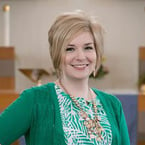I was helping a friend by driving her daughter home from school one day. My friend’s daughter is in kindergarten. She was telling me about her teacher, who was about to go on maternity leave. “Hmm . . . I never really thought about how the baby comes out. How does it come out?”
I froze. I was not prepared to answer this. I was especially not ready to explain it to a child who isn’t my own. As I paused to figure out my answer, the girl distracted herself, and I was off the hook. Rarely, though, is the escape that swift and easy.
In matters of faith, curious children desire to know everything and often ask questions that cause us to freeze. I have seen many an adult avoid a question as though they were ashamed of being “dumb.” Those same adults fear teaching children about faith for worry of seeming inferior again. At times, we do not know the answer to a question. Please know it is okay to not know. My favorite teacher responses are “I am still learning too. Let’s investigate together” and “I will research that some more and get back to you.”
Model Humility
Show children how to handle not knowing. “You know, that is a very good question. Why don’t we see what God’s Word has to say about that?” Read chapters, not verses, to get the whole context of a passage. This may mean the answer isn’t immediate. That is fine as well. Then you could say, “Let’s write an email to Pastor together. He has studied the Bible quite a lot.” Or go to him together after the service. This shows children it is okay to ask questions. It shows them how to find answers. It also builds a relationship of learning and kinship with your pastor. Know, though, that pastors don’t know everything either!
Avoid Made-Up Answers That Sound Nice
In matters of death, we squirm uncomfortably at the idea of deepening the sadness of a child. Often as a teacher, I hear children say things God has not promised us about death. “Grandpa is watching down on me from heaven.” “Grandma is an angel now.” “My dog is in dog heaven.” But these are quick shortcuts to pacify the curious mind and save ourselves from challenge. Please be brave here. Go to God’s Word and read it together. Discuss what is or isn’t true. When we avoid teaching children God’s truth for an easier out, we rob them of God’s great gift of faith in that moment. Often, we avoid topics as long as possible, and then children are confused when they get older and discover their parents’ or teachers’ answers aren’t true. Sadly, I know many adults who still believe comfortable lies that confuse them in the study of and walk in the faith.
Talk to Parents and Pastors
Ask Lutheran parents, pastors, or teachers around you what they might say. Sometimes they have great simple responses that do not add or take away from God’s Word. When I relayed my story of my friend’s daughter asking about childbirth, a co-worker of mine said she answers, “The mommy goes to the doctor, and he or she helps the baby come out.” For little minds, this is enough true information for them until they are old enough to know more.
Trust God
One of the hardest things for adults to do is be silent where Scripture is silent. It is so easy for us to fill our need for understanding by creating or speculating answers to questions the Bible doesn’t directly address. It is crucially important at these times to stop ourselves. It is amazing how our minds can adopt a thought as fact. We do not want to give children false facts that could cause them to stumble in their faith in the future. These additions can seem harmless in the moment but can slowly erode understanding over time.
Regular conversations with children about faith will lead to difficult questions. These questions are not to be avoided. Embrace them as golden. This means children’s minds are chewing on Scripture. This means you have an opportunity to chew on Scripture, too. This means you are working together to grow in faith and relationship with the Lord. All these things are beautiful.
Spend more time in God’s Word with the children in your life.
A Bible just for early readers, The Growing in Faith Bible is designed for children ages 8–10 as they grow in their relationship with their Savior.











